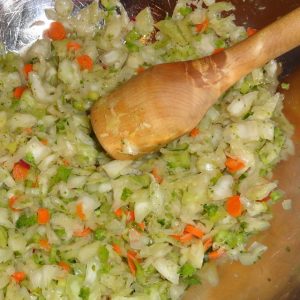Traditional Food Preparation:
Before the era of refrigeration, fermentation was used extensively in traditional societies to preserve foods. Fermentation also improves vitamin content and makes foods easier to digest. Cultures all around the world developed fermented foods unique to their region.

Kraut Pounder:
The Eugene Chapter, Weston A. Price Foundation has a special fondness for fermented foods. We have been teaching fermented foods classes since 2007. That year we also created the Kraut Pounder as a fund raiser for our chapter.
Kraut Pounder links:
Fermented foods are a wonderful source of easy to digest foods, filled with probiotic microorganisms.
Recommendations:
LACTO-FERMENTED VEGETABLES
BEST
Unheated, organic lacto-fermented vegetables (in glass jars) made with unrefined salt and/or a culture, not vinegar.
GOOD
Unheated, non-organic lacto-fermented vegetables; vegetables cultured with raw vinegar.
AVOID
All pasteurized or heated pickled vegetables and sauerkraut. Lacto-fermented vegetables containing additives such as calcium chloride.
Read more in our Shopping Guide Categories
On the Eugene Chapter website:
- Newsletter posts tagged Fermentation
- To find upcoming classes see Newsletter posts category Classes
- Read about the yummy recipes we’ve covered in our Past Classes
Articles on the Weston A. Price Foundation website:
- Lacto-Fermentation
- Kvass and Kombucha: Gifts From Russia
- Flavored Kombucha : A Home Brewer’s Guide
- Stinky, Slimy and Stringy, but the Healthiest Soyfood Ever
- Old-Fashioned, Healthy, Lacto-Fermented Soft Drinks: The Real “Real Thing”
- Fermented Honey
- Real Food Fermentation by Alex Lewin
- Wild Fermentation by Sandor Ellix Katz
Elsewhere on the web:
- Viricidal Effects of Lactobacillus and Yeast Fermentation– shows the sensitivity of certain infectious viruses to pH and temperature in a lactobacillus-inoculated food substrate
- Kimchi, a well-known traditional fermented Korean food, has proven effective against influenza virus– a little more focused study showing constituent ingredients of kimchi having antiviral properties
- Inactivation of norovirus surrogates by kimchi fermentation in the presence of black raspberry– some ingredients found in kimchi contain substances that are antiviral


